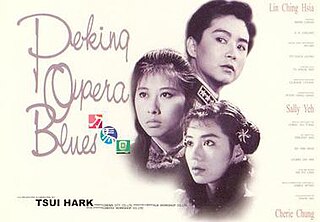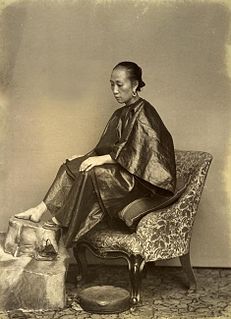
Cantonese opera is one of the major categories in Chinese opera, originating in southern China's Guangdong Province. It is popular in Guangdong, Guangxi, Hong Kong, Macau and among Chinese communities in Southeast Asia. Like all versions of Chinese opera, it is a traditional Chinese art form, involving music, singing, martial arts, acrobatics, and acting.

Peking opera, or Beijing opera, is the most dominant form of Chinese opera which combines music, vocal performance, mime, dance and acrobatics. It arose in Beijing in the mid-Qing dynasty (1636–1912) and became fully developed and recognized by the mid-19th century. The form was extremely popular in the Qing court and has come to be regarded as one of the cultural treasures of China. Major performance troupes are based in Beijing, Tianjin and Shanghai. The art form is also preserved in Taiwan, where it is also known as Guójù. It has also spread to other regions such as the United States and Japan.

Taiwanese (folk) Ke-Tse opera is the only form of traditional drama known to have originated in Taiwan;also known as Hokkien opera. The language used is a stylised combination of both literary and colloquial registers of Taiwanese Hokkien. Its earliest form adopted elements of folk songs from Zhangzhou, Fujian, China. The story elements are traditionally based on folk tales of the southern Fujian region, though in recent years stories are increasingly set in Taiwan locales. Taiwanese opera was later exported to other Hokkien-speaking areas.
Cheng Yanqiu was a Chinese Peking opera singer. He is remembered as one of the 20th-century's great female impersonators, having specialized in Peking opera's female roles (dan).
Xun Huisheng was one of Peking Opera's "Four Great Dan", along with Mei Lanfang, Cheng Yanqiu, and Shang Xiaoyun. All four were men who played the female lead roles (dan) during the generation when such roles became open to actresses again, after two centuries of exclusively male portrayal.

Cross-gender acting refers to actors or actresses portraying a character of the opposite gender.
Roy Chiao was a British Hong Kong-era Chinese actor most famous in the West for playing the minor villain Lao Che in the 1984 movie Indiana Jones and the Temple of Doom.

Letter 1949 is a 2008 Taiwanese drama starring Queenie Tai, Lin Yo-wei, Alien Huang, Hawick Lau. It was produced by Eastern Shine Production. The series was broadcast on free-to-air Chinese Television System (CTS) from 9 to 26 November 2008, Monday to Thursday at 20:00.

Mei Baojiu was a contemporary Peking opera artist, also a performer of the Dan role type in Peking Opera and Kunqu opera, the leader of Mei Lanfang Peking Opera troupe in Beijing Peking Opera Theatre. Mei’s father Mei Lanfang was one of the most famous Peking opera performers. Mei Baojiu was the ninth and youngest child of Mei Lanfang. For this reason, he was called Baojiu, since in Chinese, jiu means nine. Mei Baojiu was the master of the second generation of Méi School descendant, he was also Mei Lanfang’s only child who is now a performer of the Dan role of the Peking Opera.
Mulan Joins the Army is a 1917 Chinese-language play, which was one of the first plays and films with this title on the Hua Mulan story. It is notable for the casting of Beijing Opera legend Mei Lanfang as the heroine.
Huaihai opera is a form of local traditional Chinese theatre which combines musics, vocal performance, and dance. Some plays contain mime, acrobatics, and Kung fu. It was created in the 19th century and fully developed in the World War II. The form is popular in Shuyang, Suqian, Lianyungang and Yancheng, with the dialect of Shuyang as the standard pronunciation.
Four Dan actresses is a Chinese term referring to the four most bankable young actresses from Mainland China in the early 2000s: Zhang Ziyi, Zhao Wei, Zhou Xun, and Xu Jinglei, then all in their 20s. The designation was first made by a Guangzhou Daily editorial in July 2000. It gained widespread use in China following a series of interviews on Southern Metropolis Daily from December 2001 to January 2002. As expected, the four actresses dominated Chinese cinema in the following decade with varying degrees of success.
Ng May Ying 吳美英 is a Cantonese opera performer. Also known as Ng Mei Ying, she comes from a family of Cantonese opera actors. Ng Shang Ying 吳尚英, her adoptive father, was a ‘man mou sang’. Her uncle, Ng Hon Ying 吳漢英, was a ‘mou sang’.

Xin Fengxia was a Chinese pingju opera performer, known as the "Queen of Pingju". She was also a film actress, writer, and painter. She starred in the highly popular films Liu Qiao'er (1956) and Flowers as Matchmakers (1964), both adapted from her operas.

Wu Zuguang was a Chinese playwright, film director and social critic who has been called a "legendary figure in Chinese art and literary circles". He authored more than 40 plays and film scripts, including the patriotic drama City of Phoenix, one of the most influential plays during the Second Sino-Japanese War, and Return on a Snowy Night, which is generally considered his masterpiece. He directed The Soul of the Nation, Hong Kong's first colour film, based on his own historical drama Song of Righteousness.
Shi Yihong, known as Shi Min before 2002, is a Chinese Peking opera singer-actress who plays Dan roles. A Plum Blossom Prize winner, Shi Yihong is considered a Peking opera superstar who not only excels in both vocal and acrobatic roles, but is always experimenting and expanding her repertoire despite resistance from conservative elements. Shi Yihong is a member of the Shanghai Jingju Theatre Company, but she also established her own production company in 2016.

Wei Haimin is a Taiwanese Peking opera singer-actress who plays Dan roles. A winner of Taiwan's National Award of Art and P.R. China's Plum Blossom Prize, Wei is widely recognized a Peking opera superstar. She is a student of Mei Baojiu.
Mei Qiaoling, born Mei Fang, courtesy name Xiaobo and art name Huixian, was a Qing dynasty Peking opera and kunqu artist based in Beijing. He specialized in playing dan roles, or women. Originally from Taizhou, Jiangsu, he was sold to a childless man in Suzhou at age 8. After that man remarried and begot a son, Mei was sold again, this time to a theatrical troupe where he had to train to become a performer. He rose to stardom despite his pudginess, which earned him the nickname "Fat Qiaoling" (胖巧玲). At age 30, he became the leader of the Four Happiness Troupe (四喜班), one of the most famous troupes in Beijing, and rarely performed after that.



















